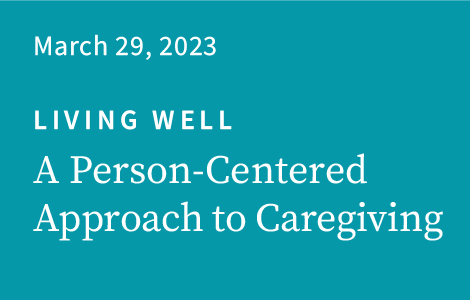Transcript
A Person-Centered Approach to Caregiving
I’d like to begin by acknowledging that outpatient clinical practices that treat people with Alzheimer’s disease and related dementias are limited by what they can do, by what they can do by way of care. As you just heard from Dr. Arnold, by and large, at this point in time, non-pharmacological approaches to care are considered the gold standard in caring for people living with dementia. These approaches, implemented and delivered by caregivers, can be applied in community-based settings, such as at home, and in long-term or memory care facilities.
In his seminal work on dementia, scholar Tom Kitwood highlights relationship, uniqueness, and embodiment as the elements of personhood, or sense of self. Because Alzheimer’s and related dementias can rob us of our sense of self, we should prioritize person-centered care for those living with dementia. Person-centered care is a philosophy of care that prioritizes the needs of the person living with dementia. This is achieved by knowing the individual through an interpersonal relationship and understanding that a person’s environment has as much effect on the brain as the brain does on the person’s abilities. High-quality, person-centered care affirms selfhood through recognition. People with dementia need comfort in order to feel safe, when they might otherwise feel as if they’re falling apart. It’s care that’s respectful. People with dementia need attachment, and they so often feel out of place. And it’s also one of trust: People with dementia need to be involved in past and current interests and sources of meaning, and they need an identity. This helps them know who they are, and have a sense of continuity with the past. Caregivers are key in helping them maintain their identities. This can be done by helping people whose cognition is declining by upholding or telling their story as a way of maintaining their individuality and their humanity.
Through research, commonalities among models and practices of person-centered care have been identified. These include supporting a sense of self through relationship-based care and services, providing individualized activities and meaningful engagement, and providing education and coaching for caregivers in their efforts to support the person living with dementia.
At this point, I’d like to share six recommendations for delivering person-centered care. These recommendations were published in The Gerontologist journal in 2018, in an article titled, “The Fundamentals of Person-Centered Care for Individuals Living With Dementia.” These recommendations are meant for families caring for a person with dementia in the home, as well as for facility-based care professionals.
The first recommendation put forth is to really know the person with dementia. The person living with dementia is more than a diagnosis. It’s important to know the unique and whole person, including his or her values, beliefs, interests, abilities, likes and dislikes, both from the past and in the present. This information should inform every interaction and experience. Family members can be called upon to tell a person with dementia’s story if they’re unable to do it themselves. For example, what did they do for a living? From what do they derive a sense of joy, meaning, and purpose? Who do they love, and what made, or makes, them happy? In a care facility, mementos of these qualities can be displayed in the room through pictures or symbols of their life before dementia.
Next, it’s important to recognize and accept the person’s reality. We need to see the world from the perspective of the individual living with dementia and avoid trying to get them to join you in your version of reality. Doing so recognizes behavior as a form of communication, thereby promoting effective and empathetic communication that validates feelings, and connects the person in their reality. One way that this could be done is implementing the rules of improv comedy, by taking a “Yes, and” approach. If the person living with dementia insists, for example, that the dome on the top of the building across the street is spinning, don’t argue. Join the person in their reality by exclaiming, “Wow, would you look at that!” and then either redirecting them or having a little fun by going further with them. There’s a wonderful episode on the This American Life podcast called “Magic Words,” and it’s in the August 15, 2014, archive. I would encourage you to listen to that for more on this technique.
The third recommendation is to identify and support ongoing opportunities for meaningful engagement. Every experience and interaction can be seen as an opportunity for engagement. Engagement should be meaningful to, and purposeful for, the person living with dementia. It should support their interests and preferences, allow for choice and success, and recognize that even when dementia is severe, a person can still experience joy and comfort and meaning in life. This brings us back to the first recommendation: Draw on what you know about the person’s past occupation and what brought meaning to their life. These are at the core of a person’s identity, which tends to remain static. If the person was a doctor before they had dementia, consult with them about a symptom. Ask questions they may have answers for. Ask for medical advice, even if you don’t use it.
When a former physicist that was in our care began pulling copper out of old television sets, and contorting it into sculptures, his wife began collecting old TVs and encouraged him to spend his time doing this thing that seemed to calm him and provide a sense of purpose. She even went so far as to frame some of his work, and they were invited to show his work at a local art gallery, which brought them both an immense amount of joy.
The fourth recommendation is to nurture and build authentic, caring relationships. People with dementia should be part of relationships that treat them with dignity and respect, and where their individuality is always supported. This type of caring relationship is about being present and concentrating on the interaction rather than the task. It’s about doing withrather than doing for, as part of a supportive and mutually beneficial relationship. If the plot of a television program can no longer be followed, just sitting together and holding hands with the television on, like you used to do, can feel warm and comforting to both people. If language is compromised, just being together and doing something enjoyable, like a walk in nature, or planting flowers in the garden, can bring people together in a relationship.
The fifth recommendation is to create and maintain a supportive community for individuals, families, and long-term care staff. The supportive community allows for comfort, and creates opportunities for success. It’s a community that values each person, and respects individual differences, celebrates accomplishments and occasions, and provides access to and opportunities for autonomy, engagement, and shared experience. Involve friends, family, neighbors, or facility staff in parties or celebrations that recognize the person with dementia. I personally know of two couples who renewed their marriage vows in front of an audience while the spouse with dementia was in memory care. Too often, support networks begin to shrink, so it’s contingent upon the caregiver to create opportunities for community and connection. Don’t be afraid to ask, even if people don’t come around or call as much as they used to.
Finally, evaluate care practices regularly, and make appropriate changes. There are tools available to assess person-centered care practice. It’s important to regularly evaluate practices and models, and make changes to interactions, programs, and practices as needed. As the illness progresses, modifications will need to be made. The recommendations provided here may need to be revisited or revised as the person with dementia changes over time.
I want to thank you for your time, and I would like to recognize that the recommendations I put forth demand much from caregivers who may already feel overwhelmed. So it’s important to know that there are resources such as counseling and coaching available to help you with this process.
Question: One of the biggest struggles I face as a geriatrician, caring for older adults with dementia, and daughter-in-law of a person with Alzheimer’s, is the cause of hiring good caregiving help. I 100 percent agree that good caregiving is the most important intervention we have, and I’m concerned that Medicare may pay for expensive diagnoses and immunotherapy, though it doesn’t cover caregiving. What should we do?
Felicia Greenfield: I think that Dr. Karlawish addressed that, when he spoke about what Medicare does and doesn’t cover. Medicare doesn’t cover in-home caregivers. So you might need help with activities of daily living, bathing, grooming. You might not be physically able to do that for the person for whom you’re caring, and you might need to bring someone into the home. The average cost in Philadelphia is about $25 an hour with a three-hour minimum for that level of care, and it’s not covered by Medicare. There are some waivers available through area agencies on aging, and, again, like Medicaid, they are income-based. So it is expensive.
Felicia Greenfield, MSW, LCSW
Executive Director
Penn Memory Center
www.pennmemorycenter.org

